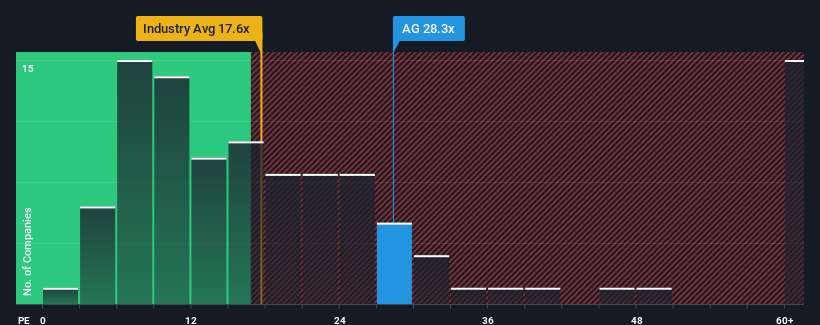Stock Analysis
- Romania
- /
- Specialty Stores
- /
- BVB:AG
Earnings Not Telling The Story For Agroland Business System S.A. (BVB:AG)

When close to half the companies in Romania have price-to-earnings ratios (or "P/E's") below 14x, you may consider Agroland Business System S.A. (BVB:AG) as a stock to avoid entirely with its 28.3x P/E ratio. Although, it's not wise to just take the P/E at face value as there may be an explanation why it's so lofty.
With earnings growth that's exceedingly strong of late, Agroland Business System has been doing very well. The P/E is probably high because investors think this strong earnings growth will be enough to outperform the broader market in the near future. You'd really hope so, otherwise you're paying a pretty hefty price for no particular reason.
Check out our latest analysis for Agroland Business System

Does Growth Match The High P/E?
In order to justify its P/E ratio, Agroland Business System would need to produce outstanding growth well in excess of the market.
Taking a look back first, we see that the company grew earnings per share by an impressive 42% last year. Still, incredibly EPS has fallen 76% in total from three years ago, which is quite disappointing. Accordingly, shareholders would have felt downbeat about the medium-term rates of earnings growth.
Weighing that medium-term earnings trajectory against the broader market's one-year forecast for expansion of 11% shows it's an unpleasant look.
In light of this, it's alarming that Agroland Business System's P/E sits above the majority of other companies. Apparently many investors in the company are way more bullish than recent times would indicate and aren't willing to let go of their stock at any price. There's a very good chance existing shareholders are setting themselves up for future disappointment if the P/E falls to levels more in line with the recent negative growth rates.
The Final Word
Using the price-to-earnings ratio alone to determine if you should sell your stock isn't sensible, however it can be a practical guide to the company's future prospects.
We've established that Agroland Business System currently trades on a much higher than expected P/E since its recent earnings have been in decline over the medium-term. When we see earnings heading backwards and underperforming the market forecasts, we suspect the share price is at risk of declining, sending the high P/E lower. Unless the recent medium-term conditions improve markedly, it's very challenging to accept these prices as being reasonable.
Don't forget that there may be other risks. For instance, we've identified 3 warning signs for Agroland Business System (2 are concerning) you should be aware of.
You might be able to find a better investment than Agroland Business System. If you want a selection of possible candidates, check out this free list of interesting companies that trade on a low P/E (but have proven they can grow earnings).
Valuation is complex, but we're helping make it simple.
Find out whether Agroland Business System is potentially over or undervalued by checking out our comprehensive analysis, which includes fair value estimates, risks and warnings, dividends, insider transactions and financial health.
View the Free AnalysisHave feedback on this article? Concerned about the content? Get in touch with us directly. Alternatively, email editorial-team (at) simplywallst.com.
This article by Simply Wall St is general in nature. We provide commentary based on historical data and analyst forecasts only using an unbiased methodology and our articles are not intended to be financial advice. It does not constitute a recommendation to buy or sell any stock, and does not take account of your objectives, or your financial situation. We aim to bring you long-term focused analysis driven by fundamental data. Note that our analysis may not factor in the latest price-sensitive company announcements or qualitative material. Simply Wall St has no position in any stocks mentioned.
About BVB:AG
Agroland Business System
Agroland Business System S.A. operates a network of agricultural stores in Romania.
Proven track record with mediocre balance sheet.

